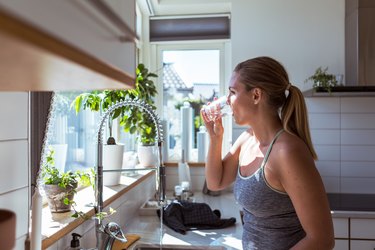
Nothing makes you feel less like your usual self than a bloated stomach, and you may be searching for remedies to help reduce the uncomfortable feeling. You may wonder: Will drinking water help bloating? It seems to help everything else.
While there's no harm in drinking water when you're feeling bloated, whether it helps you or not may depend on what's causing your bloated stomach in the first place.
Video of the Day
Video of the Day
Tip
Meeting your daily water needs is good for your health. But it may not reduce your bloating, unless your uncomfortable abdominal distention is due to premenstrual syndrome or constipation.
The Bloated Stomach
While bloating is a common complaint that can affect anyone at any age, it's not a fully understood condition, according to a May 2019 review published in Advances in Therapy. Bloating doesn't cause any changes to your gastrointestinal tract, but may cause you to feel pretty uncomfortable.
Common symptoms of bloating include:
- Abdominal discomfort and pain
- Abdominal distention
- Excess flatulence and belching
- Rumbling and grumbling in your belly
You may experience these symptoms after eating a heavy meal or ingesting something that increases gas in your gastrointestinal tract, such as carbonated beverages or beans. But in some cases, bloating can occur without overeating or the consumption of gas-causing foods.
Read more: 10 Ways to Beat Belly Bloat
What Causes the Bloat?
Your diet may be responsible for your bloated stomach, but that's not the only cause of the uncomfortable gastrointestinal condition. In some instances, your bloating may result from an underlying health issue. According to the American College of Gastroenterology, people with anxiety tend to swallow an excessive amount of air, which can lead to bloating. People with ill-fitting dentures also have the same problem.
You may also experience bloating if you have a gastrointestinal condition such as Crohn's disease or irritable bowel syndrome. Women also may have issues with bloating that accompany premenstrual syndrome. Constipation can also cause you to feel more full in your belly. And you can also develop abdominal distention and gas if you have too many friendly bacteria in your gut.
Of course, what you eat may also play a role in excess gas production that leads to bloating. Your digestive system isn't able to break down certain carbs found in foods like beans, broccoli, and cabbage. So when they reach your large intestines, the friendly bacteria break these carbs down and create hydrogen and carbon dioxide gasses.
If you have a food intolerance, such as lactose intolerance, and you consume a food with the known offender, you may experience the uncomfortable belly bloat.
Fixing the Bloat
When it comes to treatment for your bloating, you need to talk to your doctor about what may work for you. But you may be able to make modifications to your diet and some of your habits to prevent the uncomfortable abdominal distention.
There are no specific foods to reduce bloating, but if you know what foods give you trouble, then avoiding them may help prevent the bloating. Or you can try alpha-d-galactosidase, suggests the American College of Gastroenterology. It's an over-the-counter enzyme you may know better as Beano, which helps breakdown those carbs that give you trouble. You should also avoid chewing gum, drinking carbonated beverages and drinking from a straw. Taking your time while you eat your meal may also reduce the amount of air your swallow.
If constipation is the cause of your bloating, then you want to boost your daily fiber intake by eating more whole grains, nuts, seeds and non-gassy fruits and vegetables. Fiber adds bulk to your stool and softens it, making it easier for you to eliminate so you get rid of belly bloat.
Read more: Is Alkaline Water Healthy or a Hoax?
Will Drinking Water Help Bloating?
If your bloating is due to fluid retention from eating too much salt or from premenstrual syndrome, then upping your water intake may help flush out the excess fluids and help you feel more comfortable. You also want to make sure you're drinking enough water if you're adding more fiber-rich foods to your diet to help prevent constipation.
Depending on your age, gender, activity and medical history you should aim for 11 to 15 cups of water a day. Talk to your doctor for specific recommendations on how much water you should be drinking.
- Advances in Therapy: "Bloating and Abdominal Distension: Clinical Approach and Management"
- FamilyDoctor.org: "Bloating"
- American College of Gastroenterology: "Belching, Bloating and Flatulence"
- Beano: "FAQs"
- National Academy of Sciences, Engineering and Medicine: "Dietary Reference Intakes: Water and Electrolytes"
- American College of Obstetricians and Gynecologists: "Premenstrual Syndrome"
- Better Health Channel: "Fluid Retention (Oedema)"